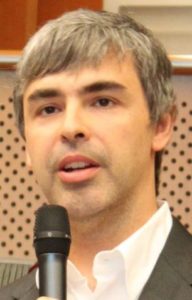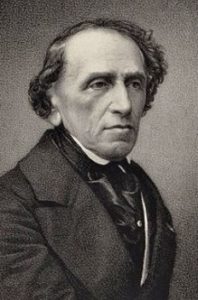Google!
 Sergey Mikhaylovich Brin (b. 1973) was born in Moscow to Russian-Jewish parents. After many long months trying to emigrate from the Soviet Union, the family was finally permitted to leave in the spring of 1979, when Brin was six years old. The family lived in Vienna, then Paris, and finally made it to the US with help from the Hebrew Immigrant Aid Society. Brin’s father got a job as a math professor at the University of Maryland, and his mother worked as a researcher for NASA. Following in his parents’ footsteps, Brin studied math and computer science at the University of Maryland. He went on to do graduate studies at Stanford, and there met Larry Page.
Sergey Mikhaylovich Brin (b. 1973) was born in Moscow to Russian-Jewish parents. After many long months trying to emigrate from the Soviet Union, the family was finally permitted to leave in the spring of 1979, when Brin was six years old. The family lived in Vienna, then Paris, and finally made it to the US with help from the Hebrew Immigrant Aid Society. Brin’s father got a job as a math professor at the University of Maryland, and his mother worked as a researcher for NASA. Following in his parents’ footsteps, Brin studied math and computer science at the University of Maryland. He went on to do graduate studies at Stanford, and there met Larry Page.
 Lawrence Edward Page (b. 1973) was born in Michigan. His mother is Jewish, and his grandfather lives in Israel. Page’s parents were both computer scientists, and he grew up immersed in technology. He was also passionate about music, and credits music training with helping to shape his analytical mind. Page studied computer engineering at the University of Michigan before heading over to Stanford. Together with Brin, the two co-authored a paper on “The Anatomy of a Large-Scale Hypertextual Web Search Engine”. They then developed a new algorithm that would dramatically improve the capabilities of search engines. Brin and Page used their dorm rooms as office and lab, scrapping together whatever money they could for servers and other parts, and slowly building the infrastructure for their new search engine. (There were a number of other people involved, too, who were instrumental in its development.) The new search engine, originally called BackRub, was launched on the Stanford website in 1996. By the following year, Brin and Page understood that the search engine had the potential to transform the world. They renamed it “Google”, and bought the google.com domain on September 15, 1997 (twenty-three years ago, today). The rest is history.
Lawrence Edward Page (b. 1973) was born in Michigan. His mother is Jewish, and his grandfather lives in Israel. Page’s parents were both computer scientists, and he grew up immersed in technology. He was also passionate about music, and credits music training with helping to shape his analytical mind. Page studied computer engineering at the University of Michigan before heading over to Stanford. Together with Brin, the two co-authored a paper on “The Anatomy of a Large-Scale Hypertextual Web Search Engine”. They then developed a new algorithm that would dramatically improve the capabilities of search engines. Brin and Page used their dorm rooms as office and lab, scrapping together whatever money they could for servers and other parts, and slowly building the infrastructure for their new search engine. (There were a number of other people involved, too, who were instrumental in its development.) The new search engine, originally called BackRub, was launched on the Stanford website in 1996. By the following year, Brin and Page understood that the search engine had the potential to transform the world. They renamed it “Google”, and bought the google.com domain on September 15, 1997 (twenty-three years ago, today). The rest is history.
Last year, Brin and Page both stepped down from Google (and its new parent company, Alphabet) though they are still employees and controlling shareholders. Both are big investors in green technology, space exploration, life extension, and Tesla Motors. They are also noted philanthropists. Among their donations are Brin’s $1 million to the Hebrew Immigrant Aid Society, and over $160 million to fight Parkinson’s disease (which his mother suffers from); and Page’s $15 million to fight Ebola and over $20 million to find treatments for vocal cord illnesses, which he suffers from. Brin and Page are currently the 13th– and 14th-richest people in the world.
Words of the Week
You always hear the phrase, “money doesn’t buy you happiness”. But I always, in the back of my mind, figured a lot of money will buy you a little bit of happiness. But it’s not really true.
– Sergey Brin

Google’s first logo, as it appeared on September 15, 1997 when the website was launched.

 Irene Sue Kerchek (1924-2020) was born in St. Louis, Missouri. She met her future husband Abraham “Abe” Pollin (1923-2009) when she was just 17. The couple married and settled in Washington, D.C. Abe worked for his father’s construction company before he and Irene started their own business in 1957. Together, they built a prosperous real estate empire, raising up both affordable and subsidized housing projects as well as luxury properties. The Pollins went on to found and own the NBA’s Washington Wizards team, the NHL’s Washington Capitals, and the WNBA’s Washington Mystics, working hard to bring those three clubs to the city. They also built the Capital Center and what is now Capital One Arena (formerly the Verizon Center), and were credited with reviving Washington’s downtown core. In 1963, the Pollins lost their teenage daughter to heart disease, and Irene lost both of her parents to heart disease that same year. She fell into deep depression and, when nothing seemed to help her, decided to go study psychology and social work herself. She went back to university and earned two degrees. Pollin opened two pioneering therapy clinics, and wrote two acclaimed books on mental illness and counseling. Her greatest mission in life, however, was to combat heart disease. In 2008, she donated $12 million to Brigham and Women’s Hospital (of Harvard) to establish a heart wellness program. In 2012, she donated $10 million to Hadassah Medical Center in Israel to create a heart health institute, and another $10 million to do the same at Johns Hopkins University. The following year, she gave another $10 million to establish one more heart health centre in Los Angeles. After discovering that more women died from heart disease than from breast cancer, Pollin started a number of organizations to increase awareness of female heart disease and to get more women screened on time. The most famous of these organizations is Sister to Sister: The Women’s Heart Health Foundation. Through their efforts, and the screening clinics they set up across America, the lives of countless women have been saved. The Pollins were generous philanthropists and gave millions more to many other causes, including Washington’s Sixth & I Historic Synagogue, the National Symphony, and research into brain disease, which ultimately took the life of Abe Pollin. The Pollins had a summer house in Rehovot, Israel, and were close friends of
Irene Sue Kerchek (1924-2020) was born in St. Louis, Missouri. She met her future husband Abraham “Abe” Pollin (1923-2009) when she was just 17. The couple married and settled in Washington, D.C. Abe worked for his father’s construction company before he and Irene started their own business in 1957. Together, they built a prosperous real estate empire, raising up both affordable and subsidized housing projects as well as luxury properties. The Pollins went on to found and own the NBA’s Washington Wizards team, the NHL’s Washington Capitals, and the WNBA’s Washington Mystics, working hard to bring those three clubs to the city. They also built the Capital Center and what is now Capital One Arena (formerly the Verizon Center), and were credited with reviving Washington’s downtown core. In 1963, the Pollins lost their teenage daughter to heart disease, and Irene lost both of her parents to heart disease that same year. She fell into deep depression and, when nothing seemed to help her, decided to go study psychology and social work herself. She went back to university and earned two degrees. Pollin opened two pioneering therapy clinics, and wrote two acclaimed books on mental illness and counseling. Her greatest mission in life, however, was to combat heart disease. In 2008, she donated $12 million to Brigham and Women’s Hospital (of Harvard) to establish a heart wellness program. In 2012, she donated $10 million to Hadassah Medical Center in Israel to create a heart health institute, and another $10 million to do the same at Johns Hopkins University. The following year, she gave another $10 million to establish one more heart health centre in Los Angeles. After discovering that more women died from heart disease than from breast cancer, Pollin started a number of organizations to increase awareness of female heart disease and to get more women screened on time. The most famous of these organizations is Sister to Sister: The Women’s Heart Health Foundation. Through their efforts, and the screening clinics they set up across America, the lives of countless women have been saved. The Pollins were generous philanthropists and gave millions more to many other causes, including Washington’s Sixth & I Historic Synagogue, the National Symphony, and research into brain disease, which ultimately took the life of Abe Pollin. The Pollins had a summer house in Rehovot, Israel, and were close friends of  Jacob Liebmann Beer (1791-1864) was born near Berlin, then in the Kingdom of Prussia, to a wealthy, observant Jewish family. His father was the president of Berlin’s Jewish community and ran a large synagogue in his home. His mother received the prestigious Order of Louise from the Prussian queen, and because she was an observant Jew, got a small statue instead of the traditional cross. The Beer children received the best secular education, as well as private tutors in Jewish studies. All three sons became famous: Wilhelm Beer as an astronomer, Michael Beer as writer, and Jacob Beer as a composer. When his beloved grandfather Meyer passed away, Jacob added the name to his own, changing it to Meyerbeer. He also vowed never to abandon the faith of his fathers, while many of his friends “converted” to Christianity to be accepted in society and to take on jobs otherwise barred to them. Meyerbeer was taught music from a young age by some of the best instructors of the time. He performed his first public concert at just age nine. Meyerbeer’s early work involved writing religious music for his father’s synagogue, and his first big production was a ballet-opera called The Fisherman and the Milkman, followed by the musical God and Nature, and the opera Jephtha’s Vow. He wrote beautiful pieces for the piano, clarinet, and full orchestras, and vacillated between composing and playing music himself (which he preferred). Having faced many difficulties in his youth, Meyerbeer founded the Musical Union to support up-and-coming composers. In 1813, he was appointed Court Composer for the Grand Duke of Hesse. Several years later, he felt he had lots more to learn and moved to Italy. There he wrote some of his most renowned operas. By 1824, he had become world-famous, and his 1831 grand opera, Robert le diable, made him the equivalent of a modern-day superstar. The following year, he received the Legion of Honour, the highest award in France. In 1841, he was described as the “German Messiah” who would save the Paris Opera from its death, and shortly after also became director of music for the Prussian royal court. Not surprisingly, his success and wealth drew the ire of his colleagues, and Meyerbeer faced terrible criticism and anti-Semitism (especially from Richard Wagner, once his pupil). Meyerbeer remained graceful nonetheless, and never responded to the attacks on him. He continued to compose popular works until his last day, and has been credited with being “the most frequently performed opera composer” of the 19th century. He inspired the works of later greats like Dvořák, Liszt, and Tchaikovsky. He was also a generous philanthropist, a devoted husband and father to five children, and never broke his vow to die an observant Jew. Meyerbeer remains one of the greatest musicians of all time.
Jacob Liebmann Beer (1791-1864) was born near Berlin, then in the Kingdom of Prussia, to a wealthy, observant Jewish family. His father was the president of Berlin’s Jewish community and ran a large synagogue in his home. His mother received the prestigious Order of Louise from the Prussian queen, and because she was an observant Jew, got a small statue instead of the traditional cross. The Beer children received the best secular education, as well as private tutors in Jewish studies. All three sons became famous: Wilhelm Beer as an astronomer, Michael Beer as writer, and Jacob Beer as a composer. When his beloved grandfather Meyer passed away, Jacob added the name to his own, changing it to Meyerbeer. He also vowed never to abandon the faith of his fathers, while many of his friends “converted” to Christianity to be accepted in society and to take on jobs otherwise barred to them. Meyerbeer was taught music from a young age by some of the best instructors of the time. He performed his first public concert at just age nine. Meyerbeer’s early work involved writing religious music for his father’s synagogue, and his first big production was a ballet-opera called The Fisherman and the Milkman, followed by the musical God and Nature, and the opera Jephtha’s Vow. He wrote beautiful pieces for the piano, clarinet, and full orchestras, and vacillated between composing and playing music himself (which he preferred). Having faced many difficulties in his youth, Meyerbeer founded the Musical Union to support up-and-coming composers. In 1813, he was appointed Court Composer for the Grand Duke of Hesse. Several years later, he felt he had lots more to learn and moved to Italy. There he wrote some of his most renowned operas. By 1824, he had become world-famous, and his 1831 grand opera, Robert le diable, made him the equivalent of a modern-day superstar. The following year, he received the Legion of Honour, the highest award in France. In 1841, he was described as the “German Messiah” who would save the Paris Opera from its death, and shortly after also became director of music for the Prussian royal court. Not surprisingly, his success and wealth drew the ire of his colleagues, and Meyerbeer faced terrible criticism and anti-Semitism (especially from Richard Wagner, once his pupil). Meyerbeer remained graceful nonetheless, and never responded to the attacks on him. He continued to compose popular works until his last day, and has been credited with being “the most frequently performed opera composer” of the 19th century. He inspired the works of later greats like Dvořák, Liszt, and Tchaikovsky. He was also a generous philanthropist, a devoted husband and father to five children, and never broke his vow to die an observant Jew. Meyerbeer remains one of the greatest musicians of all time.